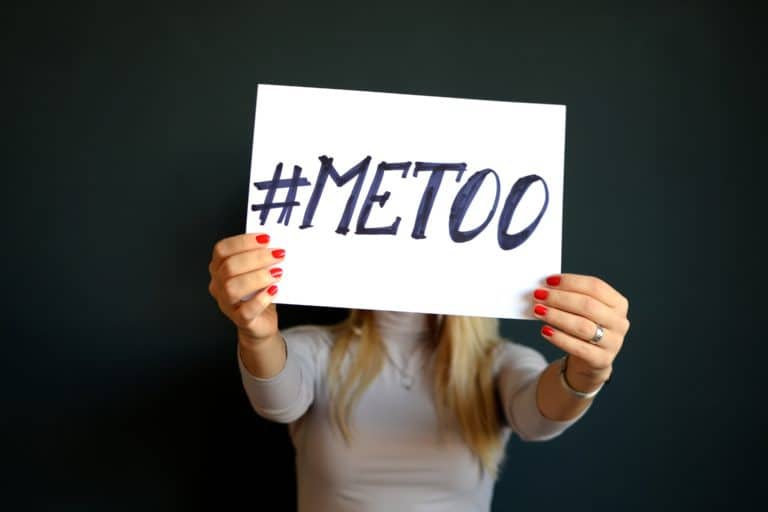
Ellie Samuels is a student at Harvard Law School.
Since 2017, the #MeToo movement has amplified survivors’ stories, demanded accountability for perpetrators, and challenged the toxic workplace environments that enable abuse. Notorious offenders like Harvey Weinstein have gone to trial and a variety of industries faced reckonings. More recently, however, as public attention has turned to high-profile misogyny campaigns and the nationwide rollback of women’s rights, some have pronounced #MeToo officially dead, while others worry backlash has eclipsed any progress.
Despite these claims, #MeToo has increased societal awareness of the pervasiveness of sexual abuse and harassment, particularly in the workplace, leading feminist activists to argue that the movement fundamentally changed cultural understandings of sexual abuse and power dynamics. Harvard Law Professor Catharine MacKinnon argues that courts are adjusting their expectations for what constitutes a “reasonable” response by a survivor of workplace assault.
Legislators are likewise energized. Since the movement began, U.S. legislatures have passed hundreds of related bills often with bipartisan support. And although passing legislation isn’t a silver bullet, it is an important indicator of the movement’s staying power in our culture and legal system. Here’s a look at how legislatures across the country have sought to transform workplace culture and help survivors find justice post #MeToo:
(1) Broadening Worker Protections
Many of the post-#MeToo laws have focused on broadening protections for survivors hoping to bring claims. States including New York, Colorado, and Vermont have removed the requirement that actionable sexual harassment be “severe and pervasive,” making their laws more lenient than the Title VII standard. In New York, for example, sexual harassment need only exceed “petty slights or trivial inconveniences” to be illegal. In the EEOC’s recent proposed guidance on workplace misconduct the Biden administration advances a broad understanding of what constitutes sexual harassment, including intersectional harassment and harassment based on reproductive health decisions.
Several states have also responded by changing the legal definition of “employee.” According to the National Women’s Law Center, ten states and Washington D.C. expanded workplace harassment protections to include “independent contractors, domestic workers, interns, volunteers, and/or employees of smaller employers.” In 2021, Texas expanded their sexual harassment laws apply to employers of every size (smaller employers had previously been exempt). These measures increase the number of survivors who can seek protection under the law and expand the ways workplace harassment and assault are legally actionable.
Another policy strategy is extending existing protections. Last November, New York state passed the Adult Survivor’s Act (ASA), which created a one-year lookback period for survivors of sexual abuse and harassment. The ASA allows individuals to file civil claims for sexual harassment or violence that occurred after they turned 18 and would have otherwise been barred by the statute of limitations. New York modelled the law after the previous Child Victims Act, which resulted in over 10,000 lawsuits during its lookback period. The ASA has already proven to be a workable tool for survivors; E. Jean Carroll recently won her case against former President Donald Trump. Some workplace claims that have been brought under the law include former employees suing Fox News, Disney, and Atlantic Records. California passed a similar law, which took effect last January. Along with lookback windows, several states, including Texas and Colorado, have extended the statute of limitations for filing workplace harassment complaints with the relevant state agency.
(2) Taking Away Abusers’ Tools
The #MeToo movement exposed how our legal system not only fails survivors, but actively enables abuse in the workplace. Employers weaponize legal tools like non-disclosure agreements (NDAs) to silence victims, and use mandatory arbitration to systematically disadvantage workers who come forward. In 2022, President Biden signed two groundbreaking federal laws that work to dismantle abusers’ favorite tools. First, the Ending Forced Arbitration of Sexual Assault and Sexual Harassment Act prevents mandatory arbitration of any claims “related to” sexual assault or harassment. Senators Kirsten Gillibrand (D-NY) and Lindsey Graham (R-SC) first introduced the law in 2017 in response to Gretchen Carlson’s lawsuit against Fox News; the company had tried to force arbitration of her sexual harassment claims against former chairman Roger Ailes. Second, the Speak Out Act prohibits judicial enforcement of non-disparagement and non-disclosure agreements in workplace sexual harassment and assault cases. The new federal law follows a trend of state restrictions on NDAs in the workplace harassment context, including in Arizona, Tennessee, and Washington. States including Utah, Kentucky, New York, and New Jersey have also been expanding their anti-SLAPP laws. These laws help prevent perpetrators from silencing victims through defamation lawsuits, an increasingly popular strategy employed by abusers.
(3) New Requirements for Employers
Lastly, many states have focused on implementing employer requirements to help prevent misconduct altogether. States including Illinois, Delaware, California, and Maine have strengthened their anti-harassment training requirements since 2017. Other states have taken measures such as establishing helplines and requiring panic buttons in the workplace. Some legislatures have prioritized increasing transparency around past misconduct. For instance, Louisiana, Maryland, and Illinois now require employers to submit annual reports of any adverse judgments or administrative rulings involving sexual harassment and discrimination to the relevant state agency.
The #MeToo Legacy
Sexual harassment and assault are still pervasive, and the perceived #MeToo backlash is not to be ignored. These new laws will face pushback—we can expect due process challenges to the use of lookback windows, for example. There are also legitimate critiques of many well-meaning #MeToo laws. Overly broad restrictions on NDAs can hurt survivors attempting to protect their privacy, and studies show certain types of workplace harassment training can backfire. Hopefully, legislatures will continue to innovate, replicating the victories while learning from any failures. Laws on paper alone won’t guarantee success: advocates must ensure that workers are well-informed about their rights, while employers must put effort into compliance and prevention. Survivors need access to the court system, where judges and juries will play a crucial role in interpreting and upholding new legislation. To be lasting and meaningful, legal solutions must coincide with persistent cultural shifts in societal attitudes toward abuse.
Despite suspicions to the contrary, the #MeToo movement changed the legal landscape. This wave of legislation is a result of survivors sharing their stories and zealous advocacy. Five years of effort has broadened the number of survivors who can brings claims, led to concrete limitations on mandatory arbitration and NDAs, and forced employers to reckon with their own role in abuse. If we can harness this shift in culture understanding and rare bipartisan enthusiasm, we can combat backlash and ensure #MeToo is here to stay.







Daily News & Commentary
Start your day with our roundup of the latest labor developments. See all
July 9
In Today’s News and Commentary, the Supreme Court green-lights mass firings of federal workers, the Agricultural Secretary suggests Medicaid recipients can replace deported farm workers, and DHS ends Temporary Protected Status for Hondurans and Nicaraguans. In an 8-1 emergency docket decision released yesterday afternoon, the Supreme Court lifted an injunction by U.S. District Judge Susan […]
July 8
In today’s news and commentary, Apple wins at the Fifth Circuit against the NLRB, Florida enacts a noncompete-friendly law, and complications with the No Tax on Tips in the Big Beautiful Bill. Apple won an appeal overturning a National Labor Relations Board (NLRB) decision that the company violated labor law by coercively questioning an employee […]
July 7
LA economy deals with fallout from ICE raids; a new appeal challenges the NCAA antitrust settlement; and the EPA places dissenting employees on leave.
July 6
Municipal workers in Philadelphia continue to strike; Zohran Mamdani collects union endorsements; UFCW grocery workers in California and Colorado reach tentative agreements.
July 4
The DOL scraps a Biden-era proposed rule to end subminimum wages for disabled workers; millions will lose access to Medicaid and SNAP due to new proof of work requirements; and states step up in the noncompete policy space.
July 3
California compromises with unions on housing; 11th Circuit rules against transgender teacher; Harvard removes hundreds from grad student union.